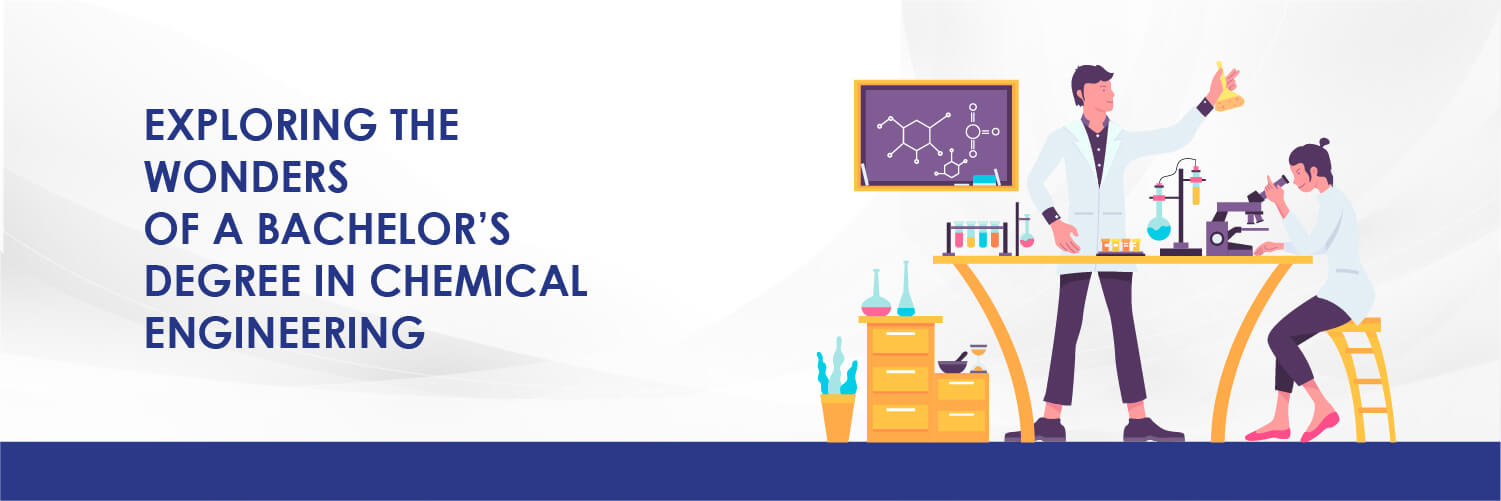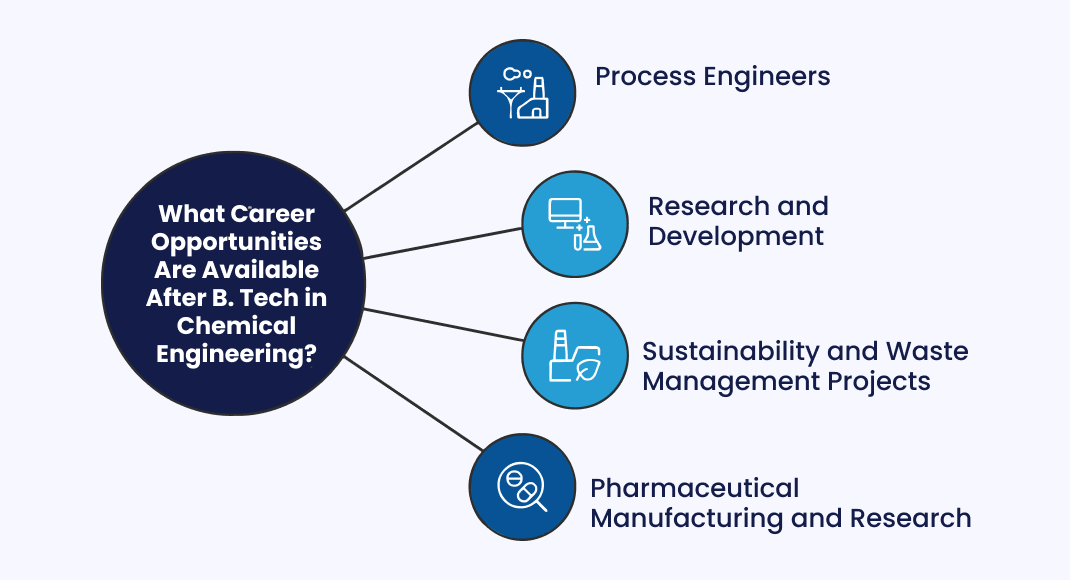Wonders of a Bachelor's Degree in Chemical Engineering
Applications of Chemical Engineering
Importance of Hands-on Learning
Skills and Competencies Developed

Diving into the world of science and innovation, a bachelor’s degree in chemical engineering stands as a unique and rapidly expanding academic pursuit in our country. According to Invest India, the market for this sector has soared to $215 billion and is projected to skyrocket to $300 billion by 2025.
The B. Tech in Chemical Engineering opens doors to a multitude of opportunities in various industries. Chemical engineers can secure positions in biotechnology, cement factories, pharmaceutical companies, fertilizer plants, petroleum refineries, food processing units, petrochemicals, and more.
In this blog, we will delve into the fascinating world of Chemical Engineering, examining the endless possibilities and exciting career prospects it presents.
What is Chemical Engineering?
Chemical engineering is the field of study that combines chemistry, physics, and math to design and create processes that convert raw materials into useful everyday products in a safe, environmentally friendly, and cost-effective manner, such as medicines, plastics, energy, and more. In the UK, student enrolments in chemical engineering and related engineering courses rose by 11% in 2024, after a 17% increase in applications, signaling growing interest in the discipline among students.
What Are the Fundamental Principles of Chemical Engineering?
- Mass and Energy Balance: Quantify the flow of materials and energy.
- Thermodynamics: Study behavior of materials and energy transfer.
- Fluid Mechanics: Analyze the behavior of fluids for transportation and mixing.
- Heat Transfer: Optimize the heat exchanger and reactor design.
- Mass Transfer: Separate, purify, and react components.
- Reaction Engineering and Kinetics: Design reactors and optimize reactions.
- Process Control: Maintain process variables for safety and stability.
- Process Design and Optimization: Design systems for efficiency, cost, safety, and the environment.
Applications of Chemical Engineering in Various Industries
- 1. Energy Production: Chemical engineers contribute significantly to the energy sector by designing and optimizing processes of oil and gas production, refining, and distribution. They also focus on designing new energy clean technologies like solar, wind, and biofuels.
- 2. Pharmaceutical: The pharmaceutical industry also benefits from the contribution of chemical engineers who design and optimize processes to manufacture drugs, vaccines, drug delivery systems, and drug formulation. They also involve themselves in drug designing, a technique for the development of new drug compounds.
- 3. Environment: Chemical engineers work on technology and processes that address environmental concerns such as air and water pollution, waste management, and sustainable energy sources. They work on designing, building, and operating wastewater treatment plants, landfill sites, and bioreactors.
- 4. Food and Beverage: In this regard, chemical engineers are involved in the development of new food products, coming up with sustainable food production methods, as well as improving on current food processing techniques. Their task involves the designing, construction, and management of processing and food plants.
- 5. Polymers and Materials Science: Chemical engineers are part of the team that designs and optimizes processes used to make plastics, fibers, and others. They are involved in developing new materials, optimizing existing processes, and developing sustainable material processing methods.
Role of Chemical Engineers in Innovation and Development
- 1. Design: Chemical engineers are important in the development of new processes, systems, and products because they know about chemistry, physics, and engineering principles.
- 2. Development: Chemical engineers are involved in the development phase of projects, where they optimize and refine processes to improve efficiency, cost-effectiveness, and sustainability.
- 3. Production: Chemical engineers supervise mass production activities, guaranteeing that the manufactured items are secure and reliable in quality and by the requirements.
- 4. Consultation: Chemical engineers provide expert advice and consultation to industries, helping them solve technical challenges, optimize processes, and improve product quality and safety.
- 5. Research: Chemical engineers play a significant role in research to uncover and develop new technologies, materials, and processes that can transform industries and push innovation further.
Importance of Hands-on Learning in Chemical Engineering
- Hands-on learning allows chemical engineering students to apply the theoretical knowledge they acquire in the classroom to real-world scenarios.
- It promotes critical thinking, fostering creativity and innovation.
- Through hands-on activities, students gain practical experience in conducting experiments, handling chemicals, and operating equipment, ensuring they are prepared for industry.
- This type of learning also encourages teamwork, communication, and leadership qualities that are very helpful in the industry.
- Chemical engineering at MIT AOE is all about practical experience. Students will be exposed to the latest technology in the chemical engineering industry to prepare them for real jobs in the industry. To learn more about B. Tech chemical engineering fees, visit our website.
Skills and Competencies Developed
1. Research and Design Skills: B. Tech in Chemical engineering will develop the ability to conduct research, collect data, and design experiments to solve complex problems.
2. Science and Math Skills: Proficiency in scientific and mathematical principles is crucial for chemical engineers to analyze data, perform calculations, and understand chemical processes.
3. Computer Skills: Competence in using various software and programming languages enables chemical engineers to model and simulate processes, analyze data, and optimize operations.
4. Problem-solving and Decision-making Skills: Chemical engineers learn to identify and solve problems efficiently, make sound judgments, and make decisions based on critical analysis.
5. Creative Thinking: Chemical engineers are encouraged to think innovatively and develop creative solutions to overcome challenges in their field.
6. Attention to Detail: Precision and accuracy are essential skills for chemical engineers, as they work with delicate processes and must ensure safety and quality in their work.
Future Trends in Chemical Engineering
- Green and Sustainable Manufacturing: This trend highlights the development of manufacturing processes that minimize environmental degradation.
- Digital Transformation and Industry 4.0: This trend employs various technologies including digital tools, big data analytics, and automation to enhance efficiency, quality, and safety in the chemical engineering process.
- Advanced Materials and Nanotechnology: This trend investigates novel materials and nanoscale technologies to improve the performance, life, and sustainability of chemicals.
- Bioprocessing and Bioengineering: Based on biological principles and techniques, this trend involves the use of organisms such as bacteria or enzymes to produce value-added chemicals, fuel, and pharmaceuticals more efficiently than it has been done before.
What Career Opportunities Are Available After B. Tech in Chemical Engineering?
After B. Tech in Chemical Engineering, graduates have access to a wide range of career opportunities in various industries. They can work as

- 1. Process Engineers: Process engineers who design and optimize chemical production processes can be B. Tech graduates in Chemical Engineering.
- 2. Research and Development: They may also embark on their careers in research and development, where they develop new materials, products, and technologies.
- 3. Sustainability and Waste Management Projects: Companies can reduce their environmental impact through projects focused on sustainability and waste management, and graduates can work on them.
- 4. Pharmaceutical Manufacturing and Research: Opportunities exist in the pharmaceutical industry, where graduates can contribute to the manufacturing and research of pharmaceutical products.
Conclusion
To sum up, there are numerous career opportunities one can obtain after acquiring a bachelor’s degree in chemical engineering in this world. The scope is wide, ranging from designing and optimizing chemical production processes to conducting sustainability projects and pharmaceutical research.
MIT Academy of Engineering (MIT AOE) is among the best institutions in the country for chemical engineering. MIT AOE has highly respected faculty members and state-of-the-art facilities, thus providing students with an outstanding education that sets them up for successful careers. If you are set to kick-start your career in chemical engineering or B Tech in chemical engineering distance education, apply now to MIT AOE. Do not miss this great opportunity to define your future.
OUR RECENT BLOG



